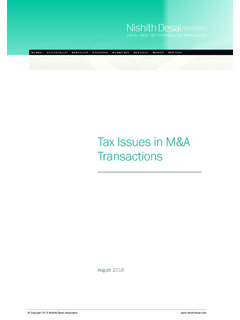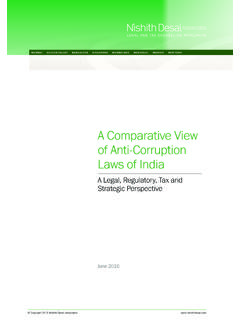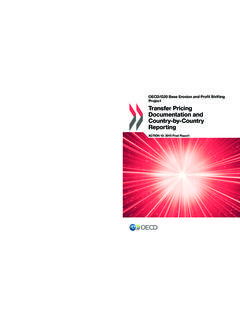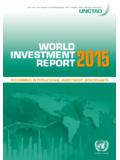Transcription of Impact on Availing Treaty Bene ts - Nishith Desai Associates
1 Impact on Availing Treaty BenefitsJuly 2017 India s MLI Positions Copyright 2017 Nishith Desai Associates MUMBAI SILICON VALLEY BANGALORE SINGAPORE MUMBAI BKC NEW DELHI MUNICH NEW YORK Nishith Desai Associates 2017 Impact on Availing Treaty Bene tsIndia s MLI PositionsContents1. INTRODUCTION 012. BACKGROUND TO base erosion AND profit shifting 023. MECHANISM 03I. Signatories or Parties to the MLI 03II. Notification of Covered Tax Agreements 03 III. Mandatory Minimum Standards under MLI 03IV. Reservations With Respect to Non-Mandatory or Optional Provisions 04V.
2 Optional provisions 04VI. Notification clauses 04 VII. Compatibility clauses 054. TIMELINES FOR MLI 07I. Entry into force 07II. Entry into effect 07 III. Entry Into Force for Article 16 on Mutual Agreement Procedure 085. ANALYSIS OF MLI PROVISION AND INDIA S POSITIONS 09I. Article 3 Transparent Entities 09II. Article 4 Dual Resident Entities 13 III. Article 5 Application of Methods of Elimination of Double Taxation 16IV. Article 6 Preamble of a Covered Tax Agreement 18V. Article 7 Prevention of Treaty Abuse 20VI. Article 8 Dividend Transfer Transactions 25 VII. Article 9 Capital Gains from Alienation of Shares or Interests of Entities Deriving their Value Principally from Immovable Property 27 VIII.
3 Article 10 Triangular PE 30IX. Article 11 Application of Tax Agreements to Restrict a Party s Right to Tax its Own Residents 32X. Articles 12 Artificial Avoidance of PE 33XI. Article 13 Artificial Avoidance of PE Status through the Specific Activity Exemptions 34 XII. Article 14 Splitting-up of Contracts 36 XIII. Article 15 Definition of a Person Closely Related to an Enterprise 37 XIV. Article 16 Mutual Agreement Procedure 39XV. Article 17 Corresponding Adjustments 416. CONCLUSION 43 Nishith Desai Associates 2017 India s MLI Positions 1 Impact on Availing Treaty Benefits1. Introduction The BEPS Project, launched during the 2008 financial crisis had the following goal: revising the international tax framework to align it with developments in the global economy, and ensure that profits are taxed where economic activities are carried out and value is created.
4 Recently in Paris, on June 7, 2017, 68 developed and developing countries signed the Multilateral Convention to Implement Tax Treaty Related Measures to Prevent base erosion and profit shifting , otherwise referred to as the Multilateral Instrument ( MLI ), to modify a large number of bilateral tax treaties entered into by over 68 countries. The signing of the MLI represents the dawn of a new era with respect to the taxation of cross-border businesses. It s entry into effect will have significant repercussions for Indian businesses with cross border operations and foreign investors keen on investing in India. Presently, the signatories to the MLI include the United Kingdom, Canada, Germany, India, Italy and Russia, while more countries such as Mauritius have expressed their desire to do so.
5 This has resulted in over 1100 treaties being potentially subject to At the same time, significant jurisdictions such as the United States, and Brazil have not signed the MLI. Furthermore, significant Treaty partners that account for a substantial amount of investments into India, such as Germany, while having signed the MLI, have not notified it as being applicable to their tax treaties with India, , the India Germany Double Tax Avoidance , the Impact will be significant and will irreversibly change the manner in which future investments into India are structured. Specifically, the provisions of the MLI requiring the mandatory amendment of bilateral tax treaties to allow for certain minimum standards to be applied in respect of bilateral treaties.
6 Importantly, the minimum standards include the denial of Treaty benefits if obtaining those benefits was one of the purposes of a transaction resulting in that benefit. From a business point of view, this will lead to difficulties for businesses based on the manner of its subjective application. While these provisions raise the level of uncertainty when it comes to structuring business operations, their applicability alongside the recently introduced Indian General Anti Avoidance Rules may reduce ease of doing business due to the ambiguity on whether both provisions could potentially be applied at the same time or to the same transaction.
7 Though the MLI in general provides much needed clarity in many respects from the perspective of the respective governments, it is clear that the lack of taxpayer involvement in the discussions has resulted in certain structural lacunae in the proposed MLI system from the taxpayer s perspective. For instance, the taxpayer has limited rights, visibility or involvement in the MAP proceedings between states, although an adverse decision is likely to affect them the most. Further, with respect to missed opportunities, such as India refusing to clarify the availability of Treaty benefits to fiscally transparent entities like trusts and partnerships or the unwillingness of India to sign up for mandatory arbitration, these are issues that can be addressed by signing up to those obligations under the MLI at a future date and to that extent, the MLI has simplified current state of affairs.
8 This paper analyses the provisions of the MLI, the provisional notifications issued by India and the choices of key Treaty jurisdictions from an Indian inbound and outbound perspective to assess the Impact that the MLI will have on business operations in India. 1. OECD, Information Brochure On Multilateral Convention To Implement Tax Treaty Related Measures To Prevent base erosion And profit shifting , June 2017 (Last Visited June 14 2017). Available at upon request only Nishith Desai Associates 2017 22. Background to base erosion and Profit ShiftingBase erosion and profit shifting ( BEPS ) is a phrase commonly used to refer to tax avoidance strategies that taxpayers use to shift their profits from high tax jurisdictions to low tax jurisdictions.
9 Such strategies are aimed at minimizing the tax paid and are usually premised on the exploitation of mismatches between the tax rules of different countries. The 2008 financial crisis led to increased global focus on such practices and the OECD, in 2013, issued a report titled Addressing base erosion and profit shifting . Following the release of this report, members of the OECD and the G20 nations adopted a 15 point Action Plan to address the problem of BEPS ( BEPS Action Plan ). Over the course of the next two years, these countries (including India) came together to work on the BEPS Action Plan ( BEPS Project ), such work resulting in the release, in 2015 of the final reports on each of the 15 items identified in the BEPS Action Plan ( BEPS Action Reports ).
10 The BEPS Action Reports seek to eradicate double non-taxation, end Treaty abuse and ensure that profits are taxed at the place of value creation. To this end, the BEPS Action Reports contain a number of tax Treaty related measures, requiring the implementation of wholesale changes to the existing international tax Treaty network. Carrying out such large scale changes on a Treaty -by- Treaty basis would have been time consuming and may have led to inconsistencies across treaties due to the politics and vagaries of bilateral negotiations. Therefore, Action 15 of the BEPS Action Plan recognized the MLI, a multilateral Treaty , as an innovative mechanism that would allow a more coordinated approach with immediate effect, while retaining the flexibility required to implement these changes in a broadly consensual framework to tackle base erosion .















